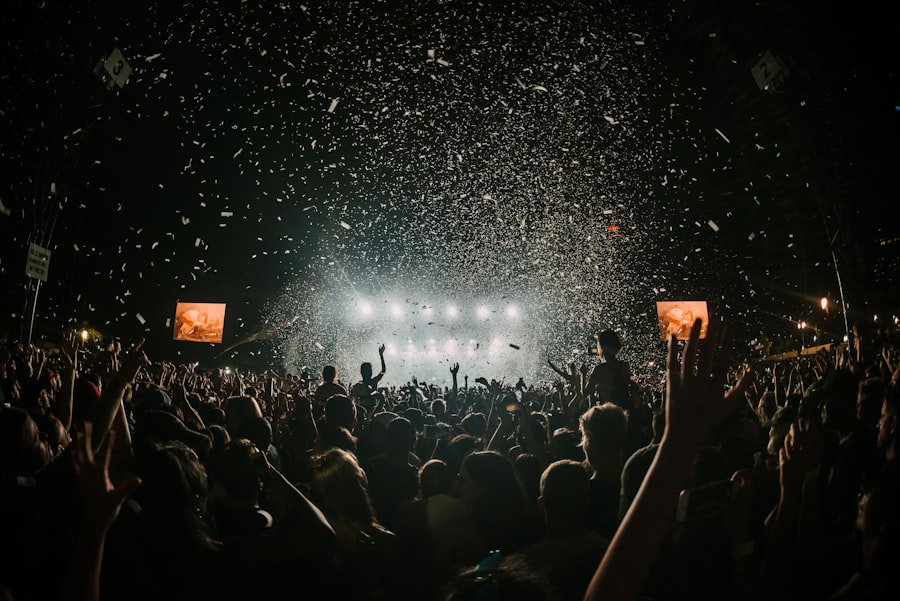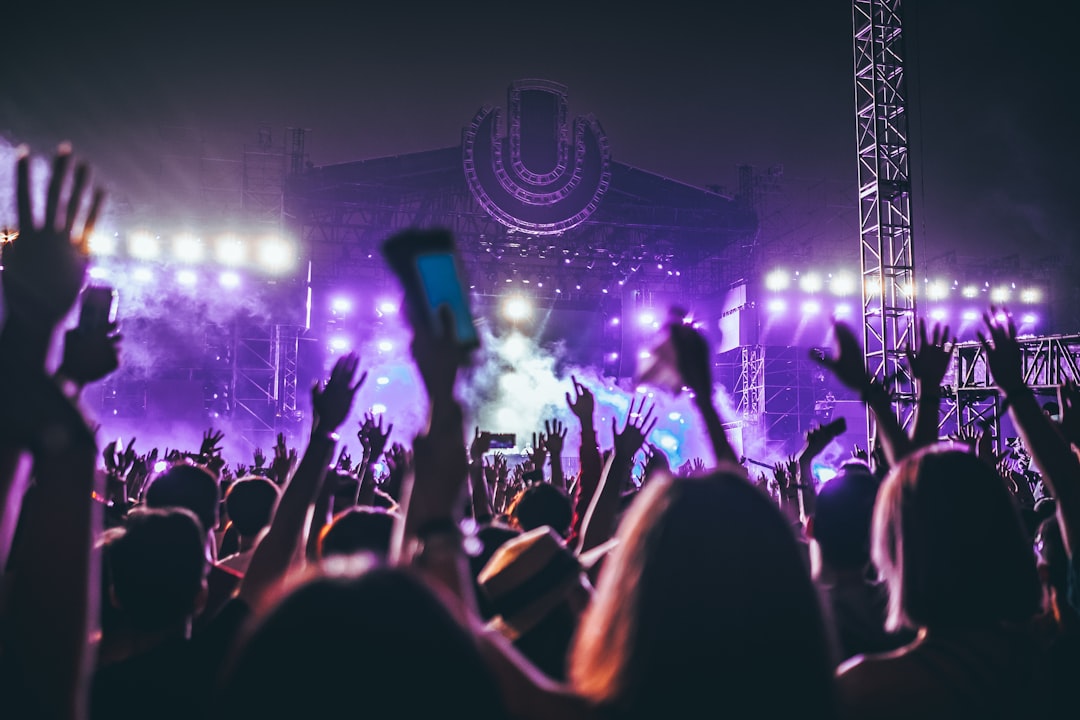Music promotion is an essential aspect of the music industry, as it helps artists and bands to reach a wider audience and gain recognition for their work. There are various strategies and platforms that can be utilized for music promotion, including social media, music blogs, streaming platforms, music festivals, collaborations with other artists and brands, and radio and podcasts. Each of these avenues offers unique opportunities for artists to showcase their music and connect with fans. In this article, we will explore the different methods of music promotion and how they can be effectively utilized to help musicians succeed in the competitive music industry.
Music promotion is not just about getting your music out there; it’s also about building a brand and creating a loyal fan base. With the rise of digital technology, there are more opportunities than ever for artists to promote their music and connect with fans. However, with so many options available, it can be overwhelming for musicians to know where to start. This article aims to provide a comprehensive overview of the various avenues for music promotion, offering insights and tips on how to effectively utilize each platform to maximize exposure and engagement.
Key Takeaways
- Music promotion is essential for artists to gain exposure and reach a wider audience.
- Social media platforms like Instagram, Facebook, and TikTok are powerful tools for promoting music and engaging with fans.
- Music blogs and online magazines provide a platform for artists to get their music reviewed and featured.
- Streaming platforms like Spotify and Apple Music offer opportunities for artists to get their music on popular playlists and reach new listeners.
- Music festivals and events are great opportunities for artists to showcase their music and connect with fans and industry professionals.
Social Media Platforms for Music Promotion
Social media has become an indispensable tool for music promotion, allowing artists to connect with fans, share their music, and build a strong online presence. Platforms like Instagram, Facebook, Twitter, and TikTok offer musicians the opportunity to engage with their audience on a personal level, share behind-the-scenes content, and promote upcoming releases and events. Utilizing social media effectively can help artists to grow their fan base, increase their visibility, and drive traffic to their music streaming platforms and websites.
One of the key advantages of social media for music promotion is its ability to create a direct line of communication between artists and their fans. By engaging with followers through comments, direct messages, and live streams, musicians can build a loyal fan base and cultivate a sense of community around their music. Additionally, social media platforms offer various tools for targeted advertising, allowing artists to reach new audiences based on demographics, interests, and behaviors. By utilizing these advertising features, musicians can expand their reach and attract new fans who are likely to resonate with their music.
Music Blogs and Online Magazines
Music blogs and online magazines are valuable resources for music promotion, as they provide a platform for artists to be featured, reviewed, and interviewed. Getting coverage from reputable music publications can help artists to gain credibility and exposure within the industry. Additionally, many music blogs have a dedicated following of music enthusiasts who trust their recommendations, making them an influential source for discovering new music.
Pitching music to blogs and online magazines requires a strategic approach, as competition for coverage is fierce. Artists should research relevant publications that align with their genre and target audience, and tailor their pitches to demonstrate why their music is a good fit for the publication’s readership. Building relationships with bloggers and journalists can also be beneficial, as it can lead to ongoing coverage and support for future releases. Overall, music blogs and online magazines offer a valuable platform for artists to showcase their music to a targeted audience of music enthusiasts and industry professionals.
Streaming Platforms and Playlists
| Platform | Number of Subscribers | Number of Playlists | Monthly Active Users |
|---|---|---|---|
| Spotify | 320 million | 4 billion | 345 million |
| Apple Music | 60 million | 2.5 billion | 60 million |
| Amazon Music | 55 million | 2 billion | 55 million |
Streaming platforms such as Spotify, Apple Music, and Tidal have become the primary way that many people consume music. For artists, getting their music featured on popular playlists can significantly boost their visibility and stream counts. Additionally, these platforms offer tools for artists to create their own artist profiles, share their music, and engage with fans through features like artist playlists and behind-the-scenes content.
One of the key benefits of streaming platforms for music promotion is the ability to track listener data and analytics. Artists can gain insights into who is listening to their music, where they are located, and which songs are resonating the most. This data can inform future marketing strategies and help artists to understand their audience better. Furthermore, streaming platforms offer opportunities for artists to collaborate with curators and influencers to get their music featured on popular playlists, reaching a wider audience and gaining exposure.
Music Festivals and Events
Music festivals and events provide artists with the opportunity to perform live in front of large audiences and connect with fans in a meaningful way. Whether it’s a local showcase or a major festival, live performances can help artists to build a dedicated fan base and create memorable experiences for their audience. Additionally, festivals often attract industry professionals such as talent scouts, record label representatives, and music journalists, providing artists with the opportunity to network and gain exposure within the industry.
Participating in music festivals and events requires careful planning and preparation, as competition for performance slots can be fierce. Artists should research relevant festivals that align with their genre and target audience, and submit high-quality press kits and promotional materials to increase their chances of being selected. Furthermore, performing at festivals provides artists with valuable live performance experience and the opportunity to connect with fans in person, creating lasting impressions that can translate into continued support for their music.
Collaborations with Other Artists and Brands

Collaborating with other artists and brands can be a powerful strategy for music promotion, as it allows artists to tap into new audiences and expand their reach. Whether it’s a featured artist on a song, a joint tour with another band, or a brand partnership for a marketing campaign, collaborations offer unique opportunities for artists to cross-promote their music and connect with new fans. Additionally, collaborating with established artists or brands can lend credibility and visibility to emerging musicians.
When seeking collaborations, artists should consider partners that align with their brand and target audience. Building genuine relationships with potential collaborators is essential, as it can lead to organic partnerships that resonate with both parties’ fan bases. Furthermore, collaborations can extend beyond just musical partnerships; artists can also explore opportunities to collaborate with brands for sponsored content, product endorsements, or live events. Overall, collaborations offer artists the chance to leverage the reach and influence of others to amplify their own music promotion efforts.
Radio and Podcasts
Radio and podcasts remain influential platforms for music promotion, offering artists the opportunity to reach audiences through curated playlists, interviews, live performances, and sponsored content. Many radio stations have dedicated shows for independent and emerging artists, providing a platform for musicians to showcase their music to a wide audience. Similarly, podcasts focused on music or specific genres offer opportunities for artists to be featured in interviews or have their music played during episodes.
Pitching music to radio stations and podcasts requires a strategic approach, as competition for airtime is high. Artists should research relevant shows that align with their genre and target audience, and tailor their pitches to demonstrate why their music is a good fit for the program’s listenership. Building relationships with radio hosts and podcast producers can also be beneficial, as it can lead to ongoing support for future releases. Overall, radio and podcasts offer valuable platforms for artists to reach new audiences and gain exposure through curated content and interviews.
In conclusion, music promotion encompasses a wide range of strategies and platforms that artists can utilize to showcase their music and connect with fans. From social media platforms and streaming services to live events and collaborations, each avenue offers unique opportunities for musicians to expand their reach and gain recognition within the industry. By understanding the strengths of each platform and tailoring their approach to align with their brand and target audience, artists can effectively leverage these avenues for successful music promotion.
Looking for the best places to promote your music? Check out this insightful article on Music Influencer that provides valuable tips and strategies for getting your music heard. Whether you’re an independent artist or part of a band, this article offers practical advice on how to effectively promote your music and reach a wider audience. Learn about the latest trends and platforms that can help elevate your music career. For more in-depth information, be sure to read the article here.
FAQs
What are some places to promote music?
Some places to promote music include social media platforms, music streaming services, music blogs, radio stations, and live music venues.
How can social media platforms be used to promote music?
Social media platforms such as Facebook, Instagram, Twitter, and TikTok can be used to promote music by sharing music videos, engaging with fans, and running targeted advertising campaigns.
What are some popular music streaming services for promoting music?
Popular music streaming services for promoting music include Spotify, Apple Music, SoundCloud, and YouTube. These platforms allow artists to upload their music, create playlists, and engage with fans.
How can music blogs help in promoting music?
Music blogs can help in promoting music by featuring new releases, conducting interviews with artists, and reviewing albums. Getting featured on popular music blogs can help artists reach a wider audience.
How can radio stations be used to promote music?
Radio stations can be used to promote music by submitting songs for airplay, participating in interviews and live performances, and building relationships with radio DJs and program directors.
How can live music venues be utilized for promoting music?
Live music venues can be utilized for promoting music by booking live performances, networking with other artists and industry professionals, and selling merchandise to fans. Performing live can help artists gain exposure and connect with new fans.

